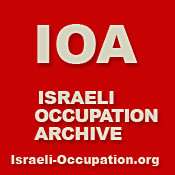By Akiva Eldar, Haaretz – 24 Sept 2012
www.haaretz.com/opinion/israel-s-five-nos.premium-1.466453

Akiva Eldar
At the height of its preparations for the holidays, Israel opened the new year with a new “no.”
Until now, there were only four: no to withdrawal from the territories that we occupied in 1967; no to dividing Jerusalem; no to the Nuclear Non-Proliferation Treaty; and no to the Arab Peace Initiative. Last Wednesday, Israel delivered another no – to the Helsinki conference on making the Middle East a nuclear-weapons-free zone, which was meant to take place late this year or in early 2013.
In an address to last week’s International Atomic Energy Agency conference in Vienna, Shaul Chorev, director of the Israel Atomic Energy Commission, declared the idea less applicable now than ever, because of the region’s volatile and hostile environment. The logic is clear: Because of the region’s volatility and hostility, Israel is boycotting a conference whose purpose is to reduce the volatility that stems from the hostility.
Brig. Gen. (res. ) Chorev repeated the Israeli mantra that Israel would support nuclear disarmament in the Middle East only after there was peace in the region, and only as a result of a local initiative, not of external coercion. Still more pristine logic: First we build settlements, annex land and reject a proposal to discuss a peace agreement on the basis of the 1967 lines. After that, we condition nuclear disarmament on relations of peace and trust. For years we have been hiding behind the slogan “as a result of a local initiative,” but that is exactly what the peace initiative that the Arab League and the Islamic states have been proposing for more than a decade is.
Has Prime Minister Benjamin Netanyahu, Chorev’s direct boss, missed the golden news from the emergency conference held by the Organization of the Islamic Conference in Jeddah last month? It’s hard to believe the intelligence community missed the punch line in the communique issued at the end of the conference, in which representatives of the Islamic states unanimously backed the Arab Peace Initiative and even mentioned the road map peace plan endorsed by the Middle East Quartet, a document that former U.S. President George Bush – not, God forbid, President Barack Obama – presented to the Israeli government.
It turns out that the Arab states have also adopted the Israeli linkage between regional peace and regional nukes. The last Arab summit, held in Baghdad at the end of March, decided, in addition to approving the 2002 peace initiative, to urge all Arab countries to participate in the Helsinki conference on a nuclear-free Middle East.
In a document submitted in May to the committee planning the NPT Review Conference in 2015, the Egyptian Foreign Ministry said the Arab League sees the Helsinki conference as an important crossroads with regard to its nuclear policies. The failure of this conference, Egypt warned, would invite the Arab states to reconsider their positions.
At a Peace Research Institute Frankfurt conference held two weeks ago in the Austrian capital, I got a chance to listen to an Iranian nuclear policy expert. He argued that while no one is overseeing Israel’s nuclear activities, Iran is paying a heavy price for its membership in the NPT, including sanctions and even military threats. He also repeated Egypt’s warning that if this trend, which is meant to perpetuate Israel’s nuclear monopoly, continues, Iran and other countries are liable to resign from the NPT.
During the last NPT Review Conference, in New York in 2010, the United States supported an Arab resolution calling on Israel to open its nuclear facilities to inspection. Obama said then that the United States was urging every country, including Israel, to be part of the NPT. But that very same day, Israeli and Jewish pressure elicited an official announcement from the White House to the effect that the United States regretted the conference’s decision to focus on Israel, and that the administration remains committed to Israel’s security.
At the time, Obama, like many in Israel and worldwide, believed that Netanyahu had abandoned Israel’s “no” policy. But how long can Israel be the only country in the Middle East that enjoys a full exemption from nuclear inspections because of a conflict it doesn’t show any interest in trying to resolve?
RELATED
Israel rejects US-backed Arab plan for conference on nuclear-free Mideast
- Tweet

Please support the IOA so that we can continue covering the Israeli Occupation. To help, please CLICK HERE







































{ 0 comments… add one now }